| Dhanshiri River | |
|---|---|
| Location | |
| Country | Bangladesh |
| District | Jhalokati District |
The Dhanshiri is a river in the Jhalokati District of Bangladesh. It is narrower than it once was. [1]
| Dhanshiri River | |
|---|---|
| Location | |
| Country | Bangladesh |
| District | Jhalokati District |
The Dhanshiri is a river in the Jhalokati District of Bangladesh. It is narrower than it once was. [1]
Local lore has it that poet Jibanananda Das had a maternal uncle in Bamankathi village (in today's Rajapur Upazila), and during his childhood visits there, he fell in love with the natural beauty of the Dhanshiri River. [2] He wrote of it poignantly in his poem "Ābāra āsiba phirē" (I will come back again):
I will come back again to Bengal, to this Dhansiri riverside
Maybe not as a man — but a shalik, or white-crest kite;
Or a dawn crow maybe, new-rice-time, in misty flight
To this jackfruit-tree-shade one Kartik day will glide. [3]
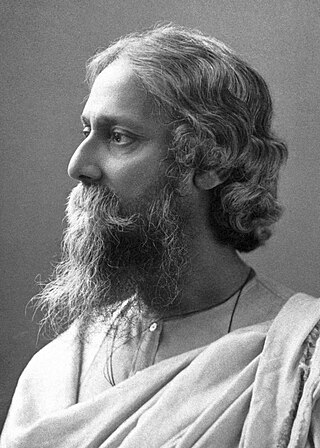
Bengali poetry is a rich tradition of poetry in the Bengali language and has many different forms. Originating in the Bengal region of South Asia, the history of Bengali poetry underwent three successive stages of development: poetry of the early age, the Medieval period and the age of modern poetry. All ages have seen different forms of poetry and poetical tradition. It reached the pinnacle during the Bengali Renaissance period although it has a rich tradition and has grown independent of the movement. Major Bengali Poets throughout the ages are Chandidas, Alaol, Ramprasad Sen, Michael Madhusudan Dutt, Nabinchandra Sen, Rabindranath Tagore, Dwijendralal Ray, Satyendranath Dutta, Kazi Nazrul Islam, Jibanananda Das, Jasimuddin, Sukanta Battacharya, Al Mahmud.

James Harrison was an American poet, novelist, and essayist. He was a prolific and versatile writer publishing over three dozen books in several genres including poetry, fiction, nonfiction, children's literature, and memoir. He wrote screenplays, book reviews, literary criticism, and published essays on food, travel, and sport. Harrison indicated that, of all his writing, his poetry meant the most to him.
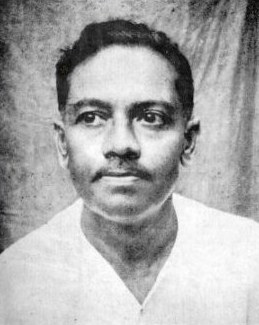
Jibanananda Das was an Indian poet, writer, novelist and essayist in the Bengali language. Popularly called "Rupashi Banglar Kabi'', Das is the most read poet after Rabindranath Tagore and Kazi Nazrul Islam in Bangladesh and West Bengal. While not particularly well recognised during his lifetime, today Das is acknowledged as one of the greatest poets in the Bengali language.

Banalata Sen is a Bengali poem written in 1942 by the poet Jibanananda Das that is one of the most read, recited and discussed poems of Bengali literature. The title of this lyric poem is a female character referred to by name in the last line of each of its three stanzas. A draft of the poem was also discovered that widely differs from the final version. Poet Jibanananda Das was a quiet person, who preferred to live in obscurity. Until the discovery of his diaries in the mid-1990s, it was considered unlikely that he could have been in love with a woman, with or without the name of Banalata Sen. However, Banalata Sen of Natore, a tiny town in the Rajshahi area of what was then Bengal, has become an emblem of feminine mystery as well as beauty and love.
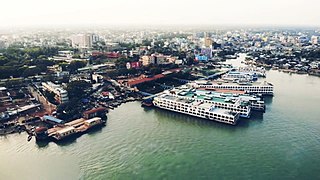
Barisal, officially known as Barishal, is a major city that lies on the banks of the Kirtankhola river in south-central Bangladesh. It is the largest city and the administrative headquarter of both Barisal District and Barisal Division. It is one of the oldest municipalities and river ports of the country. The city was once called the Venice of the East or the Venice of Bengal.
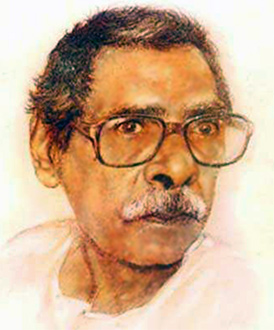
Binoy Majumdar was a Bengali poet that had received the Sahitya Akademi Award in 2005.

Fakrul Alam is a Bangladeshi academic, writer, and translator. He writes on literary matters and postcolonial issues and translated works of Jibanananda Das and Rabindranath Tagore into English. He is the recipient of Bangla Academy Literary Award (2012) in translation literature and SAARC Literary Award (2012).

Moheener Ghoraguli was an Indian rock group from Kolkata, established in 1975. Their music drew from a wide variety of influences, including Bengali folk, Baul, urban American folk, and jazz. They sometimes described their style as "Baul jazz."
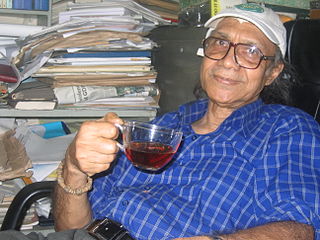
Abdul Mannan Syed was a Bangladeshi poet, and critic. He is known for his considerable research works on Kazi Nazrul Islam, Jibanananda Das, Farrukh Ahmad, Syed Waliullah, Manik Bandyopadhyay, Bishnu De, Samar Sen, Roquiah Sakhawat Hossain, Abdul Ghani Hazari, Muhammad Wajed Ali, Prabodh Chandra Sen. From 2002 to 2004, he had been the executive director of Nazrul Institute.

Chidananda Das Gupta —family name sometimes spelled 'Dashgupta' and 'Dasgupta'—was an Indian filmmaker, film critic, a film historian and one of the founders of Calcutta Film Society with Satyajit Ray in 1947. He lived and worked in Calcutta and Santiniketan.
Signet Press is a publishing house that was establishd in 1943 in Kolkata, West Bengal, India, by Dilip Kumar Gupta and his mother-in-law Neelima Guha Thakurta. Located at the famous book arcade of College Street in front of Sanskrit College. The film-director Satyajit Ray worked as a visual designer in this publishing house at the onset of his career and many of the books don the covers designed by him. The press has published many renowned books like Jawaharlal Nehru's Discovery of India, Bibhutibhushan Bandopadhyay's Pather Panchali and Chander Pahar, Jibanananda Das's Rupasi Bangla and Banalata Sen, Saat-ti taarar timir etc.By the end of the 70s though, D. K had fallen sick and soon followed by his death, The Signet Publishing house closed. It was revived back later after its purchase by the Ananda Publishers. Many of the classic signet publications are now once again available to the common readers, Be it the Samar Sen's Poem, Sukumar Roy's works or Sudhindranath Dutta's Sangbarta and Bishnu Dey's Naam rekhechi Komol Gandhar.
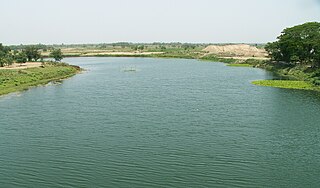
Jalangi River, is a branch of the Ganges river in Murshidabad and Nadia districts in the Indian state of West Bengal. It flows into the Bhagirathi river and strengthens its lower channel, the Hooghly.

Joe Winter is a British poet, literary critic and translator of poetry. A recent long poem is At the Tate Modern. His translations of the Bengali poets Rabindranath Tagore and Jibanananda Das are published by Carcanet Press, and his versions in modern English of the Anglo-Saxon epic Beowulf and the Middle English poem Pearl are with Sussex Academic Press. SAP has also published Two Loves I Have: a new reading of Shakespeare’s Sonnets and Hide Fox, and All After: What lies concealed in Shakespeare's 'Hamlet'?
"Bodh" is a celebrated Bengali poem written by Jibanananda Das in 1930. It was first published in the literary magazine Pragati in 1336 of Bengali calendar. The poem was later included in Jibanananda Das' poetry book Dhushor Pandulipi published in 1936. Clinton B. Seely wrote that in "Sensation", Jibanananda gives his readers an account of the burden he bore, the creative process conceived of as a presence, a constant companion, and not always a welcomed one: Prof. Alam opined that the poem is "about a man overwhelmed by the poetic fit and, indeed, consumed by it."
Banalata Sen is a poetry volume containing 31 poems by the Bengali poet Jibanananda Das (1899–1954). The volume reflects the contextual struggles experienced by the poet in terms of love, liberty and loss during the Post-Tagore period. This book has been named "Banalata Sen" after Das's most popular poem, which explored human fulfillment through the personification of a vaidya caste woman. This pattern of progressively exploring human fulfillment through hyperbolising a character is common within this volume.
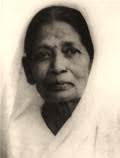
Kusumkumari Das (1875–1948) was a Bengali poet, writer and social activist. She is known as a poet and mother of Jibanananda Das, the eminent poet of modern Bengali literature and also served as the secretary of Barisal Women Society.
"Campe" is a Bengali poem by Jibanananda Das. It was first published in the literary magazine Paricay in 1932. The poem was later included in Jibanananda Das' poetry book Dhushor Pandulipi published in 1936. The poem gave rise to controversy on publication.
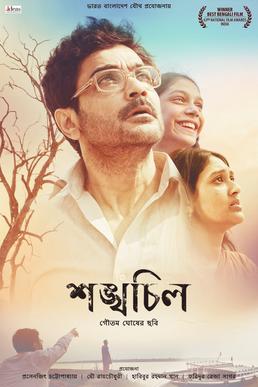
Shankhachil is a 2016 India-Bangladesh joint venture Bengali-language historical Drama film, written by Sayantani Putatunda, starring Prosenjit, Kusum Sikder, Shajbati and directed by Goutam Ghose. This film is named after the bird Brahminy kite which is used by many Bengali poets like Jibanananda Das.

Faizul Latif Chowdhury is a civil servant from Bangladesh, who currently serves as the director general of Bangladesh National Museum. Chowdhury has written on a variety of academic topics, including corruption in public administration, tax policy, economics of tax evasion and tax avoidance, smuggling, and international trade policy. He is also a translator of Bengali poetry, and has researched the modern poet Jibanananda Das. Currently he works at Independent University Bangladesh as adjunct professor business.

Ruposhi Bangla is the most popular collection of poems by Jibanananda Das, the great modern Bengali poet. Written in 1934, the sixty-two sonnets - discovered in an exercise-book twenty years after Das wrote them - achieved instant popularity on their posthumous publication in 1957, becoming a totemic symbol of freedom in Bangladesh's 1971 War of Independence. In Ruposhi Bangla, Das seamlessly blends in both real and mythical historical figures, as well as mythical creatures such as the shuk bird, weaving a tapestry of a beautiful, dreamlike Bengal The poems celebrate the beauty of Barishal. In these poems infused with a scent of unrequited love, Jibanananda Das captured his country's soul through evocations of village life and natural beauty. Satyajit Ray designed the cover of 1957 edition.
Go where you will – I shall remain on Bengal’s shore
Shall see jackfruit leaves dropping in the dawn’s breeze;
Shall see the brown wings of shalik chill in the evening,
Its yellow leg under the white down goes on dancing
In the grass, darkness – once, twice – and then suddenly
The forest’s oak beckons it to its heart’s side,
Shall see sad feminine hands – white conch-bangles
Crying like conch shells in the ash-grey wind:
She stands on the pond’s side in the evening,As if she will take the parched rice hued duck
To some land of legends –
As if the fragrance of the quiltcover clings to her body,
As if she is born out of watercress in the pond’s nest –
Washes her feet silently – then goes faraway, traceless
In the fog – yet I know I shall not lose her
In the crowd of the earth –She is there on my Bengal’s shore.
22°35′37″N90°09′52″E / 22.5935°N 90.1645°E